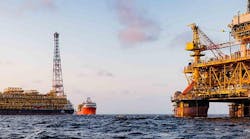Singapore's SembCorp Industries and its partners plan to spend $1 billion (Sing.), or about $588.23 million (US), in their efforts to be the main provider of support services for Jurong Island, the 3,000-hectare hub for the chemical and petrochemical industry in the island republic.
The plans include a $650 million (Sing.) cogeneration plant that will run on natural gas from the Natuna Islands area of Indonesia, said Wong Kok Siew, SembCorp president and CEO. The infrastructure and engineering giant also plans to invest $200 million (Sing.) on a desalination plant for the island and about $150 million (Sing.) for an NGL plant. About $100 million (Sing.) will be spent on subsidiary SembCorp Utilities & Terminals's (SUT) expansion plans, which include a third utilities and logistics hub.
Jurong Island expansion
Explaining the rationale for these proposed investments, Wong pointed out that, already, more than 50 companies have invested about $25 billion (Sing.) on the island, and another 100 companies plan to invest $15 billion (Sing.) more by 2010. Major investors include Royal Dutch/Shell Group, ExxonMobil Corp., Singapore Refining Co., Eastman Chemical Co., E.I. du Pont de Nemours & Co., Mitsui Corp., and Teijin Ltd.
Wong said that his company wants to be able to provide support services for all these companies, including designing and integrating the backbone of the information technology (IT) and utilities systems for the island. He disclosed that SembCorp will provide a wide range of IT services, including setting up e-business systems that will allow for integration of logistics and management of the entire supply chain�from freight forwarding, materials and inventory management, and hazardous chemical movement, to environmental protection.
SembCorp expects Jurong Island to contribute at least $50 million (Sing.) to its bottom line in 2002. The firm reported a net profit of $128.2 million (Sing.) on a turnover of $3.65 billion (Sing.) last year against a loss of $57 million (Sing.) on sales of $3.90 billion (Sing.) the previous year.
Electronic network
Meanwhile, Jurong Town Corp. has awarded the company a contract to equip the entire island for electronic commerce, part of the master-plan project initiated by Singapore's Economic Development Board (EDB), Jurong Town Corp., and Infocommunications Development Authority of Singapore.
Wong said that his company would be able to provide, for a fee, a portal for the chemicals industry through which it could perform electronic procurement, inventory control, and other e-business functions.
The proposed cogeneration plant, in which subsidiary SembCorp Engineering would have a 50% stake�with Belgium's Tractebel (30%) and EDB International (20%) as partners�would produce 815 Mw of electric power. It would also produce 700 tonnes/hr of steam, which will be sold to the various processing plants on the island.
Wong explained that, unlike many other merchant plants, steam sales from this cogen unit would be viable because the customers will be fairly close to the cogen plant.
SUT, which has already spent $305 million (Sing.) on its utilities and logistics hubs, contributed $6.5 million (Sing.) in net earnings to SembCorp in 1999. Its contribution in 2002 is expected to almost triple to $19 million (Sing.).
SembCorp Gas, which will pipe natural gas from the Natuna Islands area to the cogen plant, is now 2-3 months ahead of schedule on the project. Meanwhile, SembCorp Engineering is constructing a $32 million (Sing.) propylene purification plant to produce high-purity, polymer-grade propylene.
Feasibility studies are being conducted on a desalination plant using reverse osmosis to supply 20-30 million gpd of industrial water and on an NGL plant that would produce chemical feedstocks.
Wong remarked that the potential of Jurong Island is tremendous, and it will therefore be one of the main pillars of his company's business.
